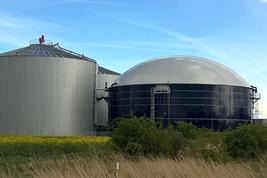30.06.2025

What can be done when a village is divided into two camps over the construction of a biogas plant? In the latest issue of the journal People and Nature, a new study by the Leibniz Centre for Agricultural Landscape Research (ZALF) shows how conflicts over land use escalate – and how this escalation can be prevented. These findings are particularly important given that such conflicts are becoming increasingly relevant in times of energy transition and land scarcity. They help communities, planning authorities, and project developers to respond to potential conflicts early on and in an appropriate manner – and to prevent them from escalating in the first place.
An example from Brandenburg: The planned expansion of a biogas plant in a small village not only led to heated debates, but ultimately ended up in court. What went wrong? What steps could the operators or the administration have taken to moderate the emerging conflict and prevent it from escalating? ZALF researcher Dr. Meike Fienitz examined this case in detail and identified five steps that turned a difference of opinion into a full-blown dispute.
Escalation is not a coincidence
In the case study, the author describes how the escalation surrounding the expansion of the biogas plant began with a lack of communication at the outset of the conflict. This led to a lack of understanding of the other side's point of view. When key players cannot imagine what a compromise might look like, they eventually become unwilling to seek a solution. Ultimately, going to court seems more attractive than joint discussions.
Specifically, the case examined concerned the planned expansion of a biogas plant. Local residents expressed concerns about increased noise, odor, traffic, and potential safety risks such as gas explosions. Although the operator offered a compromise, opponents felt they had been ignored.
The residents formed a citizens' initiative and mobilized an environmental group. They started a petition, invited the media, designed protest posters, and filed objections to the approval process. Ultimately, they decided to take legal action in the hope of making their voices heard.
“We were able to show that conflicts do not just happen, but that certain thought processes and framework conditions lead to their escalation,” says the author of the study, Dr. Meike Fienitz from ZALF. “It was particularly interesting that it was the initially weaker parties who eventually resorted to escalation – because they saw no other option.”
Identifying and defusing conflicts at an early stage
The study is based on process tracing, a method used in political science to conduct case studies. This method makes it possible to reconstruct step by step how a development—in this case, escalation—comes about. To this end, the author conducted interviews with all parties involved and evaluated documents from the planning process. The study thus builds on earlier work that had already identified key conditions for escalation, such as a high degree of emotional involvement, problematic framework conditions, and sufficient resources to resolve the conflict.
What to do with this new knowledge?
The results suggest that targeted dialogue formats should be introduced at the very beginning of a project in order to reduce misunderstandings and develop joint solutions. This also involves realistically identifying the respective expectations and making cooperation more attractive than conflict.
In addition to those directly involved in the conflict, planning authorities, local administrations, and political decision-makers also play a key role here. They can provide the necessary resources and formats and thus make a decisive contribution to preventing a conflict from escalating in the first place by creating suitable framework conditions.
In the next step, ZALF will work with partner institutions to develop practical tools and formats for better conflict management, tailored to regional conditions and the groups of actors involved.
Project partners:
- Leibniz Center for Agricultural Landscape Research (ZALF)
- Humboldt University of Berlin
Note on the text:
This is a summary of the original text created with the help of artificial intelligence:
Fienitz, M. (2025).
How do land use conflicts escalate? Identifying causal mechanisms in a conflict over a biogas plant in Brandenburg, Germany. People and Nature, 00:1–17.
https://doi.org/10.1002/pan3.70038, published open access under the CC BY 4.0 license https://creativecommons.org/licenses/by/4.0/.
The text has been carefully reviewed and revised in accordance with
AI regulations at ZALF.
Funding information:
This work was funded by the German Federal Ministry of Education and Research (grant number: 033L205A). Open access was made possible and organized by Project DEAL.
Further Information:
DOI link to the original publication:
https://doi.org/10.1002/pan3.70038
The study ties in with the following paper from 2023:
Fienitz, M., & Siebert, R. (2023). Latent, collaborative, or escalated conflict? Determining causal pathways for land use conflicts.
Land Use Policy, 134, 106918.
https://doi.org/10.1016/j.landusepol.2023.106918, published Open Access under the CC BY 4.0 license
https://creativecommons.org/licenses/by/4.0/.
